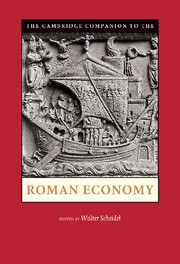Book contents
- Frontmatter
- Contents
- List of Figures
- Note on the Contributors
- Abbreviations
- The Roman world at the time of Marcus Aurelius
- 1 Approaching the Roman economy
- Part I Theory
- Part II Labor
- Part III Production
- Part IV Distribution
- Part V Outcomes
- 15 Physical well-being
- 16 Post-Roman economies
- Further reading*
- Bibliography
- Index
15 - Physical well-being
from Part V - Outcomes
Published online by Cambridge University Press: 05 February 2013
- Frontmatter
- Contents
- List of Figures
- Note on the Contributors
- Abbreviations
- The Roman world at the time of Marcus Aurelius
- 1 Approaching the Roman economy
- Part I Theory
- Part II Labor
- Part III Production
- Part IV Distribution
- Part V Outcomes
- 15 Physical well-being
- 16 Post-Roman economies
- Further reading*
- Bibliography
- Index
Summary
How did the Roman economy affect people's well-being? As I have noted in the opening chapter, there are many ways of assessing well-being, in terms of income and consumption and by considering goods such as education, security, or freedom. In this chapter I focus more narrowly on biological living standards. Did the inhabitants of the Roman Empire live longer lives, grow to be taller, and enjoy better health and diets than the populations of earlier or later periods? As we will see, the relationship between any of these features and economic performance is complex, and economic interpretations of physical well-being are fraught with great difficulties. A growing body of pertinent evidence nevertheless merits our attention. Indeed, progress in the study of Roman health and nutrition has been so rapid that any attempt to summarize the current state of knowledge is bound to be out of date almost upon publication. The following survey cannot offer more than a snapshot of recent and ongoing developments that promise to put our understanding of the quality of life in the Roman world on a more solid footing.
Longevity and mortality
Progress has primarily occurred in the study of skeletal remains. While this research has shed new light on stature, health, and nutrition, it has thus far failed to provide reliable new information on longevity. Until and unless this happens, our knowledge of this vital measure will not increase beyond what little we can say about it at present. The study of ancient life expectancy is severely constrained by our reliance on a relatively small amount of textual data.
- Type
- Chapter
- Information
- The Cambridge Companion to the Roman Economy , pp. 321 - 333Publisher: Cambridge University PressPrint publication year: 2012
- 3
- Cited by



